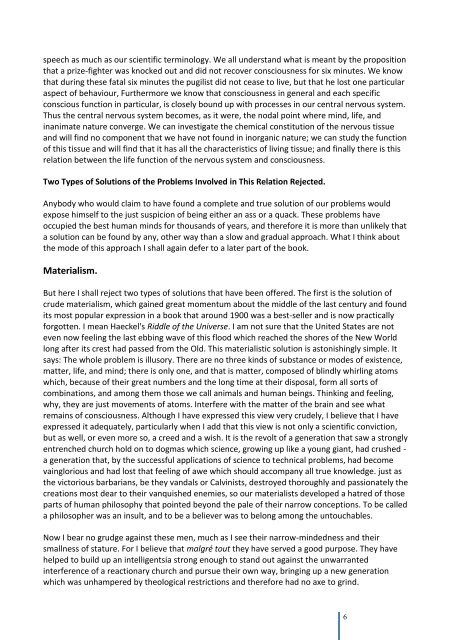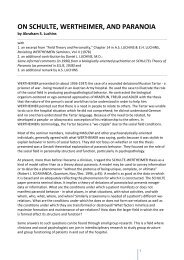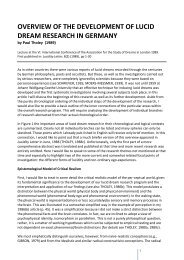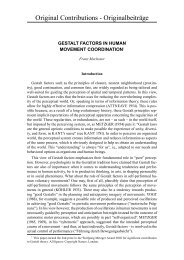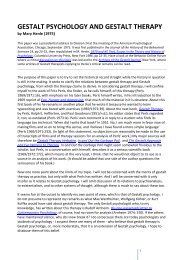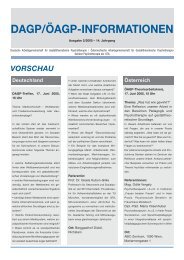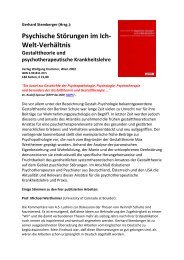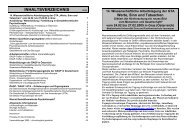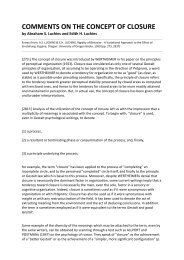Principles of Gestalt Psychology - Society for Gestalt Theory and its ...
Principles of Gestalt Psychology - Society for Gestalt Theory and its ...
Principles of Gestalt Psychology - Society for Gestalt Theory and its ...
You also want an ePaper? Increase the reach of your titles
YUMPU automatically turns print PDFs into web optimized ePapers that Google loves.
speech as much as our scientific terminology. We all underst<strong>and</strong> what is meant by the propositionthat a prize-fighter was knocked out <strong>and</strong> did not recover consciousness <strong>for</strong> six minutes. We knowthat during these fatal six minutes the pugilist did not cease to live, but that he lost one particularaspect <strong>of</strong> behaviour, Furthermore we know that consciousness in general <strong>and</strong> each specificconscious function in particular, is closely bound up with processes in our central nervous system.Thus the central nervous system becomes, as it were, the nodal point where mind, life, <strong>and</strong>inanimate nature converge. We can investigate the chemical constitution <strong>of</strong> the nervous tissue<strong>and</strong> will find no component that we have not found in inorganic nature; we can study the function<strong>of</strong> this tissue <strong>and</strong> will find that it has all the characteristics <strong>of</strong> living tissue; <strong>and</strong> finally there is thisrelation between the life function <strong>of</strong> the nervous system <strong>and</strong> consciousness.Two Types <strong>of</strong> Solutions <strong>of</strong> the Problems Involved in This Relation Rejected.Anybody who would claim to have found a complete <strong>and</strong> true solution <strong>of</strong> our problems wouldexpose himself to the just suspicion <strong>of</strong> being either an ass or a quack. These problems haveoccupied the best human minds <strong>for</strong> thous<strong>and</strong>s <strong>of</strong> years, <strong>and</strong> there<strong>for</strong>e it is more than unlikely thata solution can be found by any, other way than a slow <strong>and</strong> gradual approach. What I think aboutthe mode <strong>of</strong> this approach I shall again defer to a later part <strong>of</strong> the book.Materialism.But here I shall reject two types <strong>of</strong> solutions that have been <strong>of</strong>fered. The first is the solution <strong>of</strong>crude materialism, which gained great momentum about the middle <strong>of</strong> the last century <strong>and</strong> found<strong>its</strong> most popular expression in a book that around 1900 was a best-seller <strong>and</strong> is now practically<strong>for</strong>gotten. I mean Haeckel's Riddle <strong>of</strong> the Universe. I am not sure that the United States are noteven now feeling the last ebbing wave <strong>of</strong> this flood which reached the shores <strong>of</strong> the New Worldlong after <strong>its</strong> crest had passed from the Old. This materialistic solution is astonishingly simple. Itsays: The whole problem is illusory. There are no three kinds <strong>of</strong> substance or modes <strong>of</strong> existence,matter, life, <strong>and</strong> mind; there is only one, <strong>and</strong> that is matter, composed <strong>of</strong> blindly whirling atomswhich, because <strong>of</strong> their great numbers <strong>and</strong> the long time at their disposal, <strong>for</strong>m all sorts <strong>of</strong>combinations, <strong>and</strong> among them those we call animals <strong>and</strong> human beings. Thinking <strong>and</strong> feeling,why, they are just movements <strong>of</strong> atoms. Interfere with the matter <strong>of</strong> the brain <strong>and</strong> see whatremains <strong>of</strong> consciousness. Although I have expressed this view very crudely, I believe that I haveexpressed it adequately, particularly when I add that this view is not only a scientific conviction,but as well, or even more so, a creed <strong>and</strong> a wish. It is the revolt <strong>of</strong> a generation that saw a stronglyentrenched church hold on to dogmas which science, growing up like a young giant, had crushed -a generation that, by the successful applications <strong>of</strong> science to technical problems, had becomevainglorious <strong>and</strong> had lost that feeling <strong>of</strong> awe which should accompany all true knowledge. just asthe victorious barbarians, be they v<strong>and</strong>als or Calvinists, destroyed thoroughly <strong>and</strong> passionately thecreations most dear to their vanquished enemies, so our materialists developed a hatred <strong>of</strong> thoseparts <strong>of</strong> human philosophy that pointed beyond the pale <strong>of</strong> their narrow conceptions. To be calleda philosopher was an insult, <strong>and</strong> to be a believer was to belong among the untouchables.Now I bear no grudge against these men, much as I see their narrow-mindedness <strong>and</strong> theirsmallness <strong>of</strong> stature. For I believe that malgré tout they have served a good purpose. They havehelped to build up an intelligentsia strong enough to st<strong>and</strong> out against the unwarrantedinterference <strong>of</strong> a reactionary church <strong>and</strong> pursue their own way, bringing up a new generationwhich was unhampered by theological restrictions <strong>and</strong> there<strong>for</strong>e had no axe to grind.6


